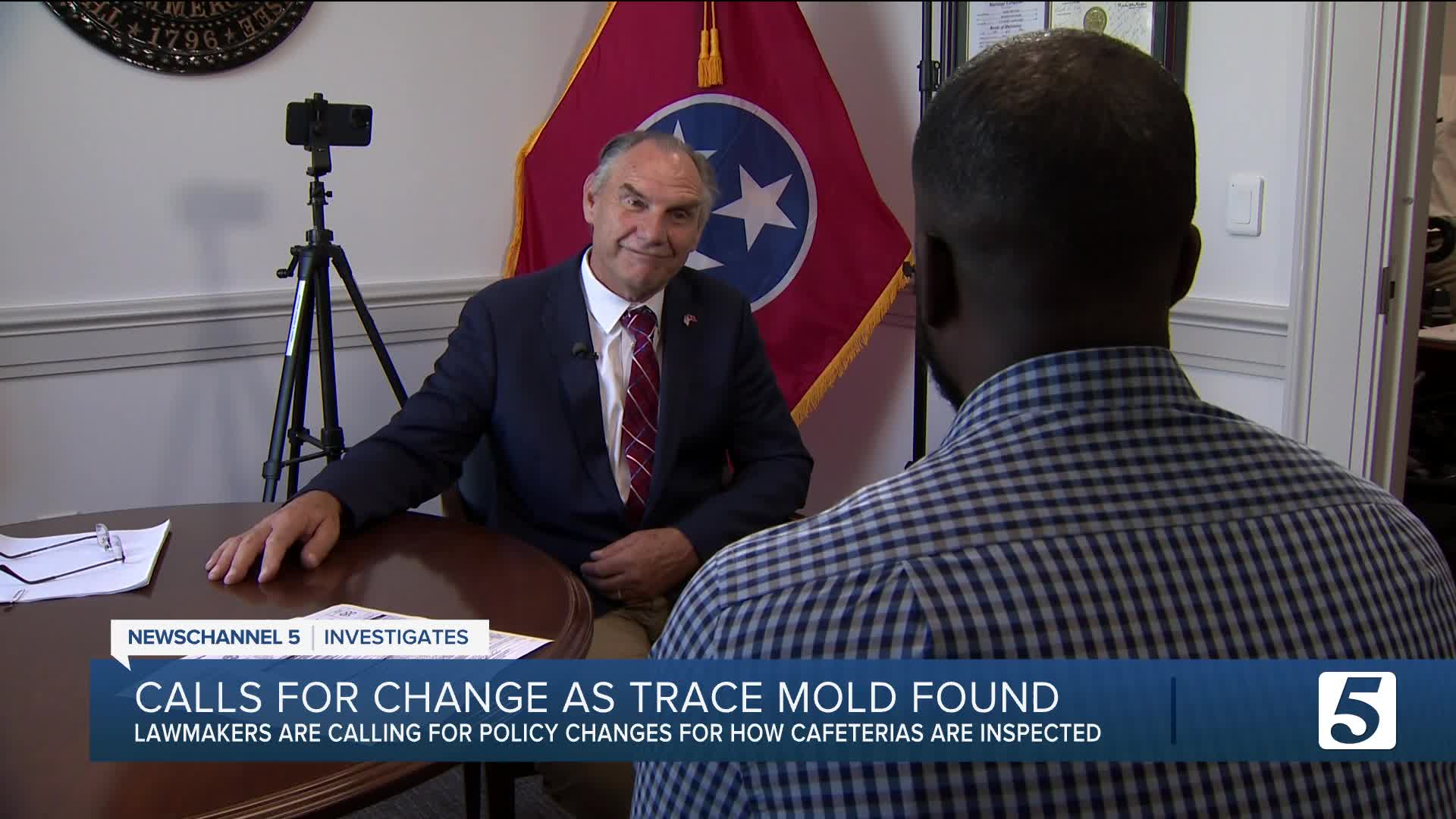MT. JULIET, Tenn. (WTVF) — Trace amounts of mold were found behind sludge on the walls of W.A. Wright Elementary School’s kitchen, and now State Senator Mark Pody says we need a better process for how school kitchens are inspected.
The reports provided to NewsChannel5 Investigates one day before school was scheduled to begin show trace amounts of mold coming from samples tested of the black substance we first shared back last month.
Engineers with Terracon Consulting believe the substance is water seeping through the roof and collecting roofing materials. While they found no asbestos, they did detect minimal mold growth associated with staining, which they say is "indicative of normal fallout from the Heating, Ventilation and Air Conditioning system or what could be caused by foot traffic in the locations."
Photos attached to the report show a brown or black substance dripping down the walls in the dry storage room, in the teacher's lounge, and in what appeared to be a classroom.



A second report analyzing air samples found no harmful compounds.
Both reports concluded that the staining was not considered hazardous in its present state, “however, the stained surfaces should be cleaned as soon as practical and the source of the roof leaks should be corrected.”
District officials confirmed with NewsChannel5 Investigates that all recommendations in these reports have been completed, which includes cleaning affected areas, stopping the leaks and repairing the roof.
All this follows reporting by NewsChannel5 Investigates, where we learned that for the past couple of years that W.A. Wright Elementary School’s kitchen received 98’s and 99’s out of 100 by inspectors for the Tennessee Department of Health.
After multiple attempts to reach the department for comment, we shared our reporting with State Senator Mark Pody, who was shocked by what was happening in his district.
“The optics of that were terrible, and then to know it was in the cafeteria near the food was very disconcerting,” Pody said.
Pody had no trouble reaching officials with the TN Department of Health, and soon after, we got the following email describing their process for inspection:
“Typically, when the Department conducts a food inspection in a school, our staff will look for food-related items of concern and then work with the administration of the school to get those items corrected. Staff also look at the school building itself and will note any concerns. Inspection scores reflect what is observed at the time of the inspection and is set forth in the TN Food Safety Act and rules. We do not have the authority to vary from what is in the statute/rules.”
The three reports, dating back to February 2024, mention a brown or black substance that, in some cases, was dripping from the ceiling and onto yogurt and canned drinks.
The report did not explain what the substance was and never requested a follow-up investigation.
Pody described it as an inspector documenting a fire in the other room, but doing nothing to stop it.
“If they felt they were following their standard procedure, then their procedure is wrong,” Pody said.
The senator wants to see a change in the criteria for how inspectors grade school cafeterias moving forward.
“That’s something we’re looking at, whether we have to do it by change in the law or they can do it just by procedure, but it needs to be done so it’s addressed properly,” Pody said.
Pody says he’s now spoken with the state, district leaders and the school board, who have all assured him there’s no public safety issue for the children.
When asked if he would eat in that kitchen, Pody responded, "If the state was there and they looked at it and they felt it was safe enough for the kids, I have to have some confidence that it was safe, but optically, nobody would like to eat in something like this if they see the junk coming down the wall."
Former nutritionist Shanell Saddler told us in June that she was forced to leave after confronting officials about concerns over the black substance.
Saddler said she sacrificed her job to ensure parents knew what was happening at their children's school. School officials later said Saddler was not terminated, but she has no intentions of returning. Her primary concern remains protecting the students.
"I'm afraid that it will not be fixed and that the kids will constantly be sick from it. That's what I'm afraid of," Saddler said.
Saddler suspected the presence of mold, after telling us that she, too, had trouble breathing, and it only happened when she was in the building.
The parents we spoke to were shocked when we shared images of the substance dripping down the walls, but none of them recalled their children being any more sick than usual.
When asked why parents weren't notified about issues documented for years, district spokesperson Bart Barker said, "If we felt there was a crisis involving this school and children's health, then absolutely there would have been communication, but at no point have we felt like that."
Barker provided a statement saying that if any issues or concerns are raised in the coming months by school administrative staff or district maintenance, "then the district would certainly notify the outside companies associated with this project about it and bring those concerns to their attention."





